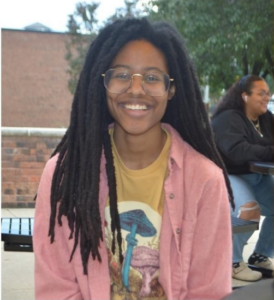Mia-Sara King is a junior at Rowan University. She is a writing arts major and the senator for Poetic Justice, a poetry club at Rowan University. King has been interested in writing since she was a child. She chose to come to Rowan because she wanted to major in writing, and other colleges only offered writing as a minor. Her writing developed when she went to high school.
“One of the biggest changes in my writing happened around high school. That’s when I first got into spoken word poetry,” King said. “It has parameters but there’s no rules with it.”
Rowan has helped her immensely with her spoken word poetry. It helped her gain a foothold in the community, which was constructed by Professors Stephen Cobb and Cherita Harrell.
“I’d never performed spoken word before I came to Rowan,” King said. “When I came to Rowan, that was one of the first things I looked for; opportunities to perform on stage or to a live audience.” With the spoken word community being assembled, this has aided King’s skills.
“By being involved in that community, it helped me to spark my creativity,” King said. “Being around so many like-minded people, it’s inspiring. It makes you feel less alone in something very personal.”
Poetic Justice is a new club here at Rowan and has inspired King because being around so many other poets makes her want to write more. Sarah Kay is one of King’s biggest inspirations. Other people who inspire Mia-Sara are Rudy Francisco, Noah Kahan, and AJR.
King’s process of writing her poetry is very free-flowing. It consists of her writing all the time and when she thinks of something, she writes it down either in her notes or on a piece of paper. King would later combine all those notes into an organized poem.
“I’ve done pieces on toxic masculinity and depression. It’s usually whatever I’m feeling at the moment. I get inspiration from a lot of different places,” King said.
The way King handles constructive criticism is different from other artists in their respective fields.
“It’s a weird zone with poetry. It’s emotional and a part of you. Once I say something is done, I rarely want to change it. The criticism would have to get to me before that stage,” King said.
Balancing school and her poetry isn’t a big difficulty for King, because most of her classes deal with the art form.
“I’m lucky in the fact that so much of my school is creative stuff. I get to be in the writing world all the time,” King said.
When it comes to King’s style of writing, she is unsure of what it is. She uses metaphors, figurative language, and some rhyming schemes. King has advice for anyone who wants to get into poetry.
“Anyone can do it. There are no special requirements. You don’t have to study this, that, or the other to be a poet. It’s helpful and inspiring to look at people who mastered the craft before you. There’s no standard,” King said. “Poetry is a genre but it’s also a medium. It doesn’t have to be deep or serious or emotional for it to be a good poem,” King elaborated. “You can write something light and happy and lovely. It doesn’t have to be grimdark to be worthwhile poetry. There’s no limits on it.”
For comments/questions about this story DM us on Instagram @thewhitatrowan or email the.whit.arts@gmail.com






